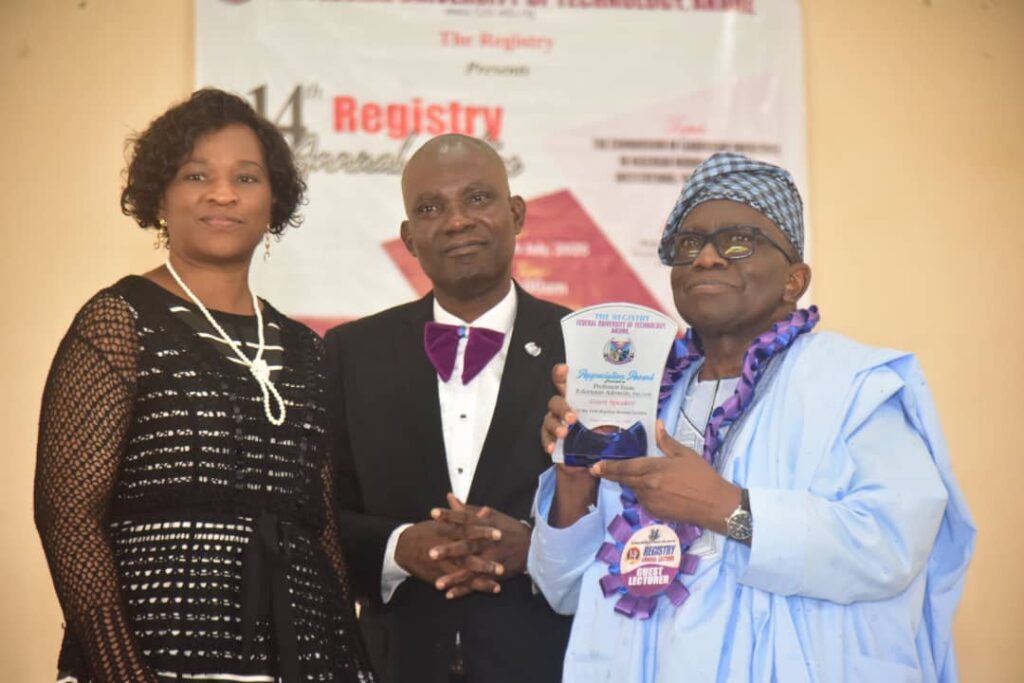Former Minister of Health and 11th Vice Chancellor of the University of Ibadan, Professor Isaac Adewole, has identified ethnicity, regionalism, and political interference as the major challenges affecting leadership selection in Nigerian higher institutions.
Delivering the 14th Registry Annual Lecture of the Federal University of Technology, Akure (FUTA), Prof. Adewole spoke on the theme, “Conundrum of Leadership Emergence in Nigerian Higher Education Institutions: The Missing Links.” He argued that the dysfunctions in academic leadership reflect broader governance issues in the country.
He said leadership selection in universities is too often influenced by patronage, favoritism, and external political pressures—factors that override merit and compromise institutional integrity.
“Appointments are sometimes driven by political considerations rather than competence,” he said. “Patronage weakens the integrity of the selection process and can result in the emergence of leaders who lack the necessary skills or vision.”
Prof. Adewole also highlighted ethnic and regional loyalties as disruptive influences that often lead to factionalism and division within academic institutions.
He said the absence of structured leadership development and succession planning in most universities further compounds the problem. “Leadership emergence in many cases is informal, reactive, or based solely on mentorship rather than a systematic approach,” he noted.
To improve the process, Prof. Adewole recommended a multi-pronged strategy that includes structural reforms, capacity building, and transparent, merit-based selection systems.
He advised that governing councils take a more rigorous approach to vetting candidates for vice-chancellorships and other key roles. He proposed a dedicated orientation period between appointment and assumption of duty to better prepare new vice-chancellors.
“The Committee of Vice-Chancellors (CVC), the Association of Vice Chancellors of Nigerian Universities (AVCNU), and the National Universities Commission (NUC) should play central roles in ensuring these processes are well coordinated and professionally executed,” he added.
He also advocated that outgoing vice-chancellors be excluded from the selection process of their successors to maintain fairness, while the Registrar, as secretary to the council, must remain an impartial advisor.
According to him, a redefinition of university roles and a restoration of autonomy are essential. He warned that academic freedom has been gradually eroded due to the politicization of governing councils, reduced funding, and centralized control mechanisms such as uniform salary scales and central admissions.
“There are no privileges without responsibilities. Universities must reclaim their space as centres of intellectual freedom and creativity,” he said.
In conclusion, Prof. Adewole emphasized that the absence of a coherent, merit-based, and future-oriented leadership development framework is the missing link in Nigeria’s higher education. He called for urgent reforms to build globally competitive institutions led by visionary and competent leaders.
“Through transparent processes, inclusive governance, and sustained investment in leadership training, Nigerian higher institutions can reclaim their place as global centres of excellence and innovation,” he said.
Earlier, FUTA Registrar and Chief Host, Mr. Charles Adeleye, described the lecture as timely and critical to ongoing conversations around educational reform, leadership, and governance.
“This annual lecture has become a strong intellectual tradition in FUTA. It supports reflection and best practices in registry operations and university administration,” he said.
Vice Chancellor, Professor Adenike Oladiji, commended the Registry for sustaining the lecture series. She described the event as a platform for introspection on the nature and quality of leadership in Nigerian universities.
“FUTA remains committed to building a culture of principled leadership, rooted in integrity, professionalism, and academic excellence,” she said.
Chairman of the Local Organising Committee, Mr. Isaac Fafila, described the lecture as pivotal to the growth of university registries and leadership development across the Nigerian tertiary education system.














